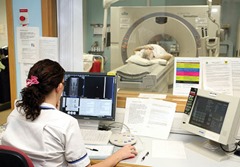Electronic care records rolling out
 Everyone in Northern Ireland should have an electronic care record by December. agendaNi considers its benefits.
Everyone in Northern Ireland should have an electronic care record by December. agendaNi considers its benefits.
All health and social care records in the province will transfer to the Northern Ireland Electronic Care Record (NIECR) by December in a shift that is expected to improve care for all patients and clients. Records are currently transferring to the new system and the project is due to be completed by December 2013.
“The NIECR gives our doctors and nurses a window into all the important health and care information that they need to provide the best care for a patient,” Health Minister Edwin Poots said in April. “They will be able to look at information currently held in a multitude of different systems across the Northern Ireland health and social care sector to see details of past or on-going diagnoses and investigations or treatments.”
In April, the Minister had seen the benefits first-hand on a visit to the Southwestern Medical Centre, in Dallas, including predictions of potential illness, maximising the uptake of screening programmes and limiting adverse drug reactions.
Doctors would be able to use the NIECR to check x-rays and test results on desktop computers as soon as they are available. Treatment can therefore start sooner. Staff will be able to spend more time working directly with patients than oswn paperwork.
The Department of Health, Social Services and Public Safety published 760,000 leaflets to inform every household in the province about the changes.
Poots added: “Confidentiality and data security remain a key priority across the [health and social care system] and the NIECR has undergone rigorous testing and can only be accessed by authorised staff over the secure health and social care network who need to see it to support patient care.”
A proof-of-concept pilot in 2010 involved 200 clinical staff in the Ulster Hospital, Belfast City Hospital and general practices. This was judged a success and a contract was signed in May 2012 with Orion Health to deliver the portal and integration technology. The value of contract is £9 million over the next seven years.
Orion is a global, independently owned health software company and was founded in New Zealand in 1993. Its Rhapsody Integration Engine is used by most US state health systems and the USA’s public health agency: the Centers for Disease Control and Prevention.
All health and social care records are public records under the Public Records Act (Northern Ireland) 1923. Further legal safeguards were provided under the Data Protection Act 1998 and the Freedom of Information Act 2000.
The department’s official guidance on records management is available at www.dhsspsni.gov.uk/index/gmgr
While best known for its archives, the Public Record Office of Northern Ireland oversees the overall management of public sector records, which includes ensuring the proper use of digitised records. Senior managers are personally accountable for records management within their organisation and have a duty to arrange for the safe-keeping and eventual disposal of records.
BMA calls for joined up access
The British Medical Association has emphasised the need for electronic care records to be made available to out-of-hours and A&E doctors.
Its Northern Ireland general practice spokesman, Dr Tom Black, said that this would improve patient care “particularly when it comes to significant events in their past medical history, any history of allergies and a record of their medication.”
Dr Black added: “GPs are very aware that patients expect to have their confidentiality protected, so it is important that records are shared on a need-to-know basis for treatment. Consent is required for access to each record, and there is an audit trail of access for reassurance.”





